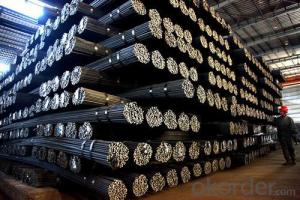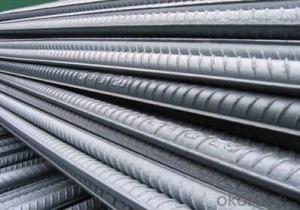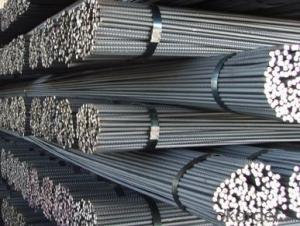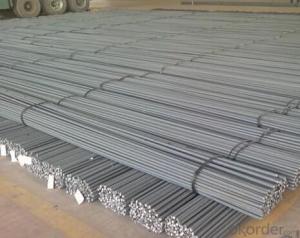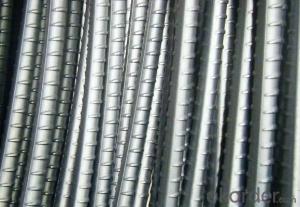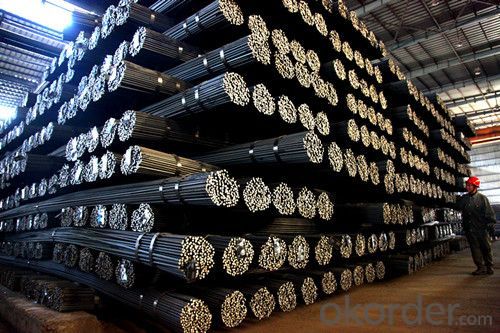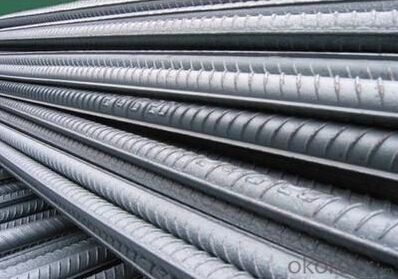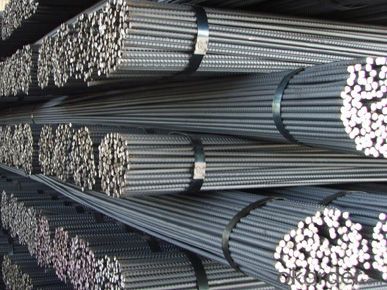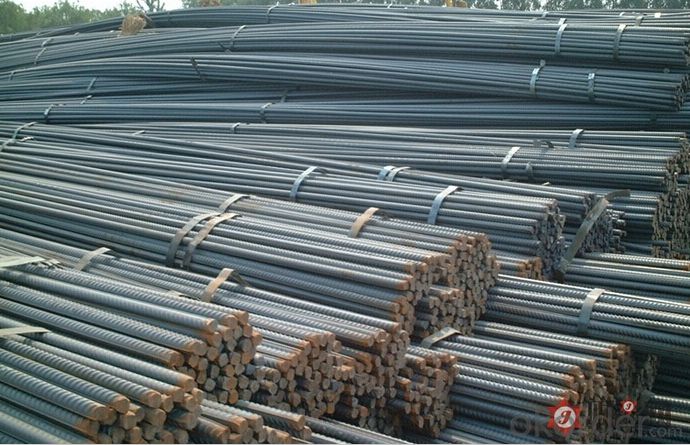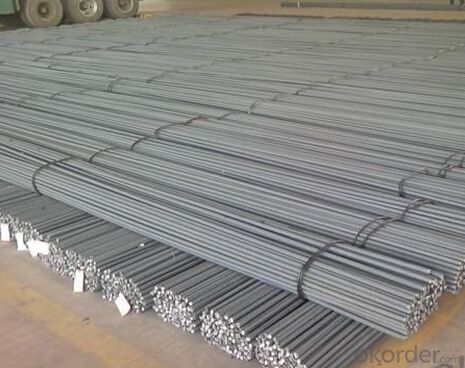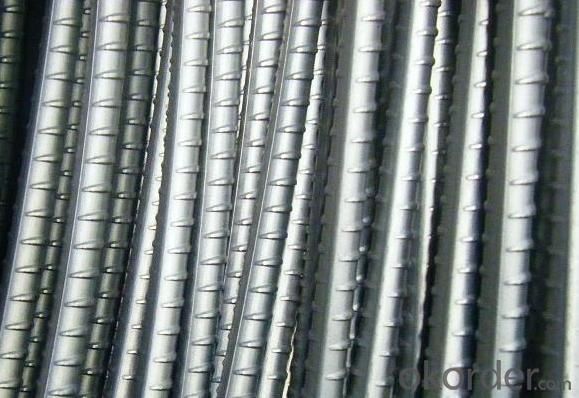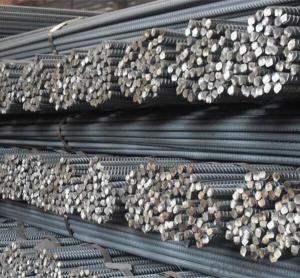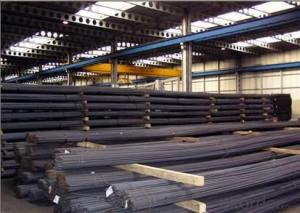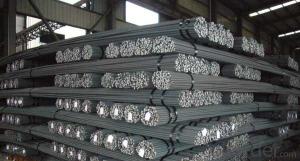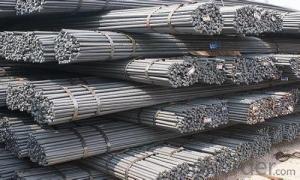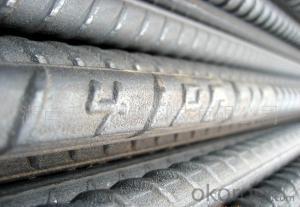CNBM Grade ASTM A615 Steel Deformed Bar Price
- Loading Port:
- Tianjin
- Payment Terms:
- TT OR LC
- Min Order Qty:
- 50 m.t.
- Supply Capability:
- 10000 m.t./month
OKorder Service Pledge
OKorder Financial Service
You Might Also Like
Specification
CNBM Grade ASTM A615 Steel Deformed Bar Price
Details of CNBM Grade ASTM A615 Steel Deformed Bar Price
Name | Deformed Bar |
Shape | Round Bar |
Standard | 1.GB1499.2-2007, HRB335, HRB400E 2. ASTM A615 Gr.40, Gr.60 3.BS4449/1997 |
Diameter | 6mm-50mm |
Length | 6m, 8m, 9m,12m as standard or as request |
Test | SGS/UT 100% Elements Testing |
Certificate: | ISO/Mill Certificate |
Service: | 24 hours online service / |
more than 20 years trading and manufacture | |
Quality Assurance: | the third party inspection, such as SGS, BV, TUV…etc. is acceptable |
Packaging Details: | Seaworthy Packaging or as per customer's packing instruction |
Specification of CNBM Grade ASTM A615 Steel Deformed Bar Price
Standard | Grade | Yield Strength Mpa | Tensile Strength | Elongation% |
BS4449:1997 | 250 | 250 | 295 | 22 |
460A | 460 | 485 | 12 | |
460B | 460 | 500 | 15 | |
GB1499.2-2007 | HRB335/335E | 335 | 455 | 17 |
HRB400/400E | 400 | 540 | 17 | |
HRB500/500E | 500 | 630 | 16 | |
ASTM A615 & A615M-04a | GRADE40 | 280 | 420 | 12 |
GRADE60 | 420 | 620 | 9 | |
GRADE75 | 520 | 690 | 7 | |
JIS G3112-2004 | SD295A | ≥ 295 | 440-600 | 17 |
SD295B | 295-390 | ≥ 440 | 17 | |
SD345 | 345-440 | ≥490 | 19 | |
SD390 | 390-510 | 560 | 17 | |
SD490 | 490-625 | ≥ 620 | 13 |
Size | WEIGHT | WEIGHT | QUANTITY | ||
LENGTH 6M | LENGTH 12M | LENGTH 6M | LENGTH 12M | ||
6 | 0.222 | 1.332 | 2.664 | 751 | 375 |
8 | 0.395 | 2.37 | 4.74 | 422 | 211 |
10 | 0.617 | 3.702 | 7.404 | 270 | 135 |
12 | 0.888 | 5.328 | 10.656 | 188 | 94 |
14 | 1.21 | 7.26 | 14.52 | 138 | 69 |
16 | 1.58 | 9.48 | 18.96 | 106 | 53 |
18 | 2 | 12 | 24 | 83 | 42 |
20 | 2.47 | 14.82 | 29.64 | 67 | 34 |
22 | 2.98 | 17.88 | 35.76 | 56 | 28 |
25 | 3.85 | 23.1 | 46.2 | 43 | 22 |
28 | 4.83 | 28.98 | 57.96 | 35 | 17 |
32 | 6.31 | 37.86 | 75.72 | 26 | 13 |
36 | 7.99 | 47.94 | 95.88 | 21 | 10 |
40 | 9.87 | 59.22 | 118.44 | 17 | 8 |
50 | 15.42 | 92.52 | 185.04 | 11 | 5 |
CNBM Introduction of CNBM Grade ASTM A615 Steel Deformed Bar Price
CNBM International Corporation is the most import and export platform of CNBM group(China National Building Material Group Corporation) ,which is a state-owned enterprise, ranked in 270th of Fortune Global 500 in 2015.
With its advantages, CNBM International are mainly concentrate on Cement, Glass, Iron and Steel, Ceramics industries and devotes herself for supplying high quality series of refractories as well as technical consultancies and logistics solution.
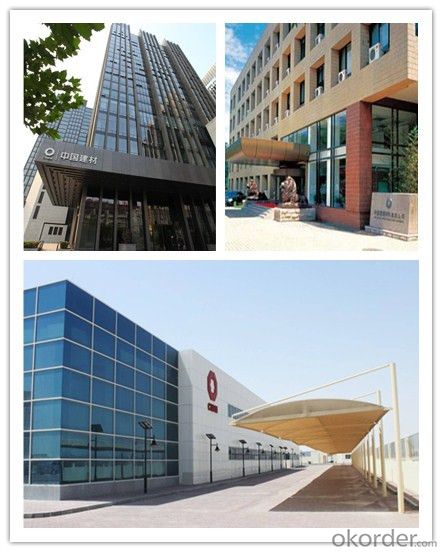
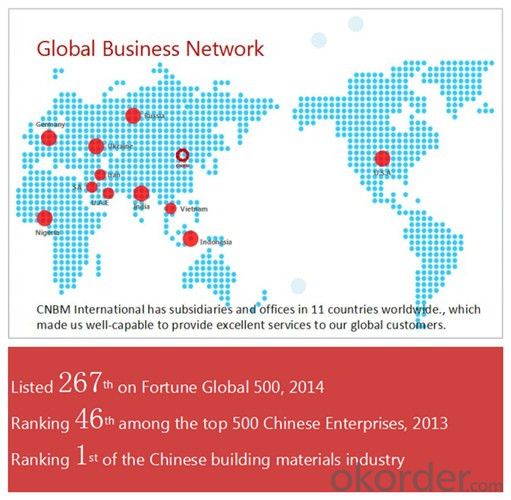
Packaging & Delivery of CNBM Grade ASTM A615 Steel Deformed Bar Price
Packaging Detail | Sea worthy packing /as per customer's packing instruction |
Delivery Detail | 15 ~ 40 days after receiving the deposit |
Products Show
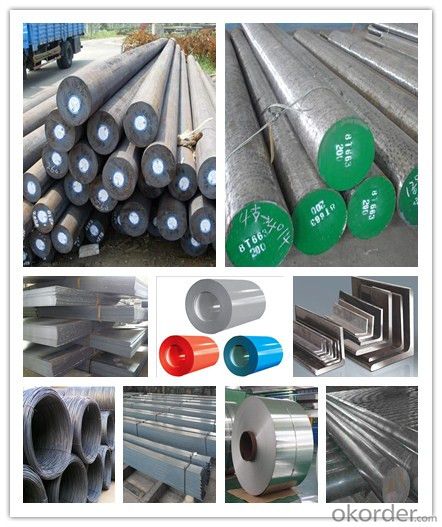
FAQ:
Are you a trading company or manufacturer? | Manufacturer |
What’s the MOQ? | 3 metric ton |
What’s your delivery time? | 15-35 days after downpayment received |
Do you Accept OEM service? | Yes |
what’s your delivery terms? | FOB/CFR/CIF |
What's the Payment Terms? | 30% as deposit,70% before shipment by T/T |
Western Union acceptable for small amount. | |
L/C acceptable for large amount. | |
Scrow ,Paybal,Alipay are also ok | |
Why choose us? | Chose happens because of quality, then price, We can give you both. Additionally, we can also offer professional products inquiry, products knowledge train (for agents), smooth goods delivery, excellent customer solution proposals. |
What's your available port of Shipment? | Main Port, China |
What’s your featured services? | Our service formula: good quality+ good price+ good service=customer's trust
|
Where are your Market? | Covering more than 160 countries in the world |
- Q: What are the different oil and gas grades of special steel?
- There are several different oil and gas grades of special steel, including but not limited to API 5CT, API 5L, and ASTM A106. These grades are specifically designed to meet the requirements and demands of the oil and gas industry, ensuring high strength, corrosion resistance, and durability in harsh environments.
- Q: What are the different forms in which special steel is available?
- Special steel is available in various forms such as bars, sheets, plates, coils, tubes, pipes, and wires.
- Q: Can special steel be used in the railway industry?
- Yes, special steel can be used in the railway industry. Special steel alloys are often utilized in the manufacturing of railway components such as rails, wheels, and axles. These alloys possess enhanced mechanical properties, including increased strength, durability, and resistance to wear and fatigue. This allows the railway infrastructure to withstand heavy loads, high-speed trains, and harsh operating conditions, ensuring the safety and reliability of railway systems.
- Q: How is leaded steel used in machining operations?
- Leaded steel is commonly used in machining operations due to its enhanced machinability. The addition of lead to the steel composition improves its cutting properties, allowing for smoother and more efficient machining. This type of steel is especially useful in applications that involve high-speed machining, such as turning, drilling, and milling. Additionally, leaded steel offers excellent chip control and reduces tool wear, making it a preferred choice in various machining operations.
- Q: How does special steel contribute to the infrastructure development?
- Special steel is a crucial component in infrastructure development as it offers enhanced strength, durability, and resistance to extreme conditions. It is used in the construction of bridges, buildings, pipelines, and other critical structures, ensuring their longevity and safety. Additionally, special steel's versatility allows for the creation of innovative designs, facilitating the construction of complex and efficient infrastructure systems.
- Q: What are the different surface cleaning methods used for special steel?
- There are several surface cleaning methods used for special steel, including mechanical cleaning, chemical cleaning, and electrochemical cleaning. Mechanical cleaning involves the use of abrasive tools or equipment to remove dirt, rust, or other contaminants from the surface. Chemical cleaning involves the use of chemicals, such as acids or solvents, to dissolve or remove contaminants. Electrochemical cleaning utilizes an electrical current to remove contaminants and improve the surface finish. Each method is chosen based on the specific requirements and condition of the special steel being cleaned.
- Q: What are the challenges in working with special steel?
- Working with special steel presents several unique challenges compared to working with regular steel. Here are some of the main challenges one may encounter when working with special steel: 1. High cost: Special steels often have higher production costs due to their unique composition and properties. The raw materials used in their production may be rare or require complex manufacturing processes, leading to increased costs. 2. Limited availability: Special steels are not as widely available as regular steels, making it more challenging to source them. This limited availability can lead to longer lead times and potentially higher costs when trying to procure the necessary materials. 3. Complexity in machining: Special steels can be difficult to machine due to their high hardness or toughness. Their unique properties may cause excessive tool wear, leading to increased machining time and costs. Specialized cutting tools and machining techniques may be required to overcome these challenges. 4. Heat treatment requirements: Special steels often require precise and specific heat treatment processes to achieve the desired mechanical properties. The complexity of heat treatment can be a challenge, as it requires careful control of temperature, time, and cooling rates. Improper heat treatment can lead to inconsistent material properties or even material failure. 5. Weldability issues: Some special steels may have poor weldability compared to regular steels. They may be prone to cracking or require preheating and post-weld heat treatment to ensure proper joint integrity. This can add complexity and cost to welding processes. 6. Corrosion resistance: While special steels may possess excellent mechanical properties, they can sometimes be more susceptible to corrosion compared to regular steels. This requires additional measures to protect the steel from corrosion, such as applying protective coatings or using corrosion-resistant alloys. 7. Knowledge and expertise: Working with special steels often demands a higher level of technical knowledge and expertise. The unique properties and characteristics of these materials require a deep understanding of their behavior and how to effectively work with them. This may require specialized training or collaboration with experts in the field. Despite these challenges, working with special steel can also offer various benefits, such as superior strength, durability, and performance in specific applications. By understanding and addressing these challenges, engineers and manufacturers can harness the unique properties of special steel to develop innovative and high-quality products.
- Q: What are the different methods for nitriding special steel?
- There are several methods for nitriding special steel, including gas nitriding, salt bath nitriding, plasma nitriding, and ion nitriding.
- Q: How is special steel used in the automotive industry?
- Special steel is used in the automotive industry for various applications such as manufacturing engine components, transmission systems, and chassis parts. Its high strength, durability, and resistance to corrosion make it ideal for ensuring the safety, performance, and longevity of vehicles. Additionally, special steel is used in the production of specialized tools and machinery required for automotive manufacturing processes.
- Q: What are the different methods of improving the machinability of special steel?
- There are several methods that can be employed to improve the machinability of special steel. These methods include: 1. Alloying: By introducing certain alloying elements, such as sulfur, selenium, lead, or bismuth, into the steel composition, the machinability can be enhanced. These elements act as lubricants during machining, reducing friction and cutting forces. 2. Heat treatment: Heat treatment processes like annealing, normalizing, or stress relieving can help improve the machinability of special steel. These processes refine the microstructure, reduce hardness, and increase ductility, making the material easier to machine. 3. Microstructural modifications: Modifying the microstructure of special steel through processes like grain refinement or controlled precipitation of carbides can enhance machinability. Fine-grained steels are generally easier to machine due to reduced cutting forces. 4. Surface coatings: Applying specialized coatings, such as titanium nitride (TiN) or diamond-like carbon (DLC), on the surface of special steel can reduce friction, improve tool life, and enhance chip flow during machining. 5. Tool selection and optimization: Choosing appropriate cutting tools with specific geometries, coatings, and cutting parameters can significantly improve machinability. Optimal tool selection ensures efficient chip evacuation, reduces heat generation, and minimizes tool wear. 6. Machining parameters optimization: Adjusting machining parameters like cutting speed, feed rate, and depth of cut can have a significant impact on machinability. Fine-tuning these parameters can help reduce tool wear, control chip formation, and achieve better surface finish. 7. Lubrication and cooling: Proper lubrication and cooling methods, such as using cutting fluids or coolants, can enhance machinability by reducing friction and heat generation during machining. This helps prolong tool life and minimize workpiece deformation. It is important to note that the specific method or combination of methods used to improve machinability will depend on the type of special steel and the desired machining outcome.
Send your message to us
CNBM Grade ASTM A615 Steel Deformed Bar Price
- Loading Port:
- Tianjin
- Payment Terms:
- TT OR LC
- Min Order Qty:
- 50 m.t.
- Supply Capability:
- 10000 m.t./month
OKorder Service Pledge
OKorder Financial Service
Similar products
Hot products
Hot Searches
Related keywords
